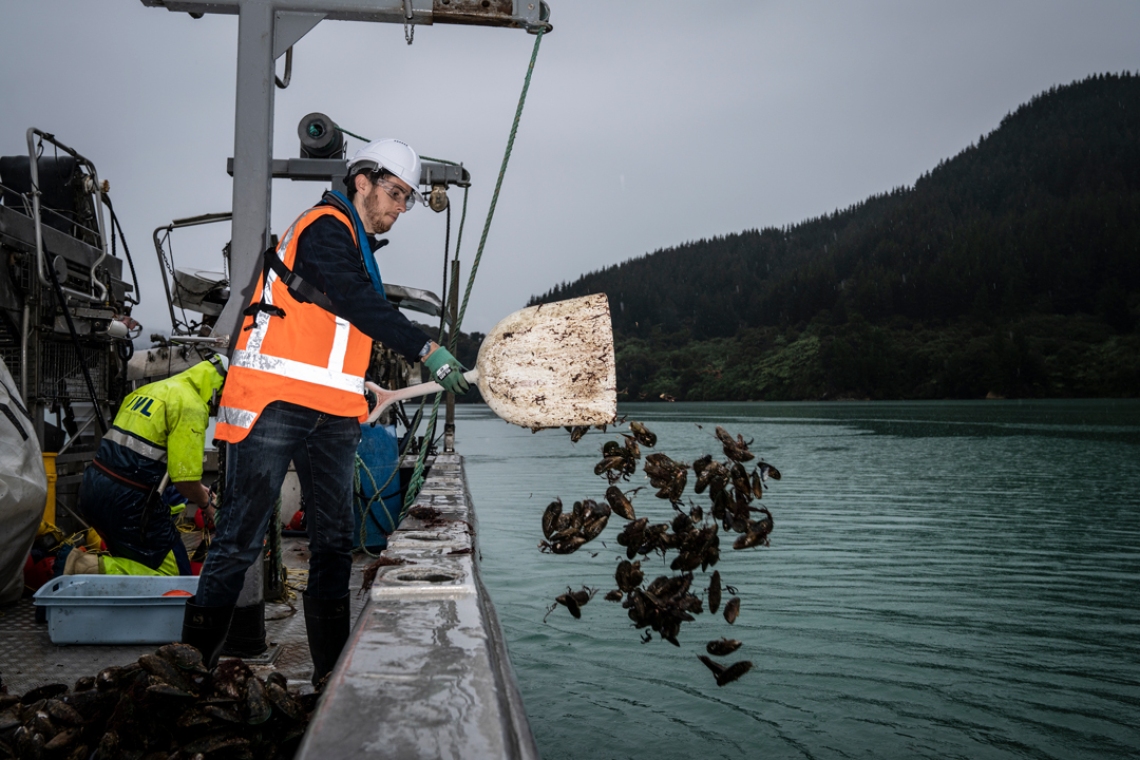Wild mussels are making a comeback in the Marlborough Sounds. Mussels, first wild and now farmed, have put Havelock on the map as the ‘Green-Lipped Mussel Capital of the World’. While farmed mussels are booming, the wild population has experienced a big decline. Now local marine farmers, scientists and iwi have joined forces to turn the fate of wild mussels around.
You can’t take a trip to the Marlborough Sounds without noticing the patchwork of buoys bobbing in the blue waters. Suspended under these buoys are kilometres of lines, each in turn with their own much smaller lines trailing beneath. It is these lines that support the green-lipped mussels farmed below.
Mussels, as hardy filter-feeders grow well on lines, benefitting from the flow of seawater and reduced predation that comes with elevation. The lines also provide easy access for marine farmers to check and harvest their stock. This sustainable production system yields a nutritious treat in little more than 18 months from seeding.
Historically, wild green-lipped mussels were gathered direct from the Sounds’ seabed and shorelines. Land-use changes and harvesting have contributed to the reduction of these natural beds since the 1970’s.
Auckland University PhD candidates Emilee Benjamin and Trevyn Toone are working closely with NIWA researchers, local marine farmers, iwi and the Ministry of Primary Industries (MPI) to identify the best ways to restore wild mussel beds in Pelorus Sound.
Marlborough remains a highly productive green-lipped mussel region, but that productivity now comes from farmed mussels. With hundreds of farms throughout the Sounds, this region rightfully call itself the ‘Green-lipped Mussel Capital of the World’.
The aquaculture industry is prospering and wants to give back to the environment that supports it by donating farmed stock to rewild the once-native beds that the industry was built upon.
The team has monitored mussel and ecosystem health in the newly reseeded beds for three years. The project was developed so that farmed mussels could be put back on the sea floor to restore the habitat and jump-start a natural recovery process. Five tonnes of farmed mussels were collected, clumped together, and dropped into the sea.
Simon Pooley, owner of Joint Mussel Ltd, has a deep connection with the aquaculture industry in the Sounds.
“Having been a mussel farmer for most of my life, it’s very close to home and to see natural mussel beds restored is probably one of the best things to happen around here.
“From an environmental perspective it’s a good, healthy, and positive thing to do. And it’s reasonably easy from a farming perspective because they’re such a robust shellfish. “
The plots that the mussels land in are measured, the mussels within them counted, and some are sampled to determine their condition. It’s early days but scientists are already seeing signs of success.
Benjamin describes mussels as “really incredible animals”.
“They filter water and bind sediment. They also create infrastructure on the seabed, so when we put mussels back into the environment, they will create habitats, biodiversity, and provide food for some animals.
“Just 24 hours after reseeding a mussel bed, we’ve seen high numbers of animals moving in, including lots of fish. I’ve seen some sea cucumbers and triplefins fluttering around. It made me smile because the mussels had already been building homes after just one day.”
Pooley says that it’s important to contribute back to the environment.
“Marlborough Sounds is a beautiful place and it’s where lots of people have made a livelihood, either off the land or the sea. When you’ve spent long enough in a place like this, you have an affection for it. It gets inside of you and being able to take care of it comes naturally.
“You can’t just take; you’ve got to give.”
This story forms part of our 2021 Summer Series. Check out more stories from the series.

